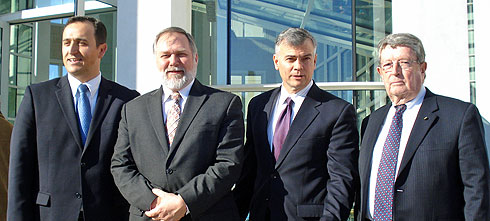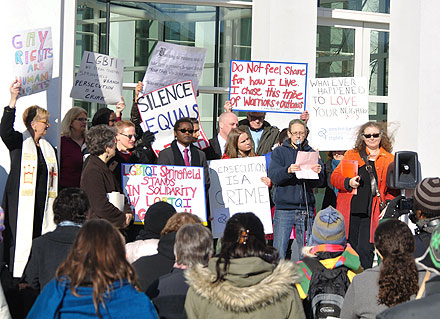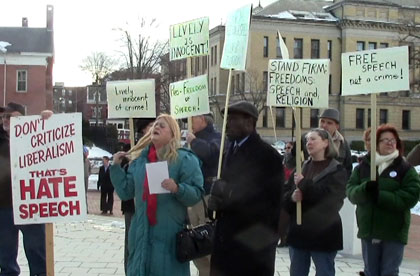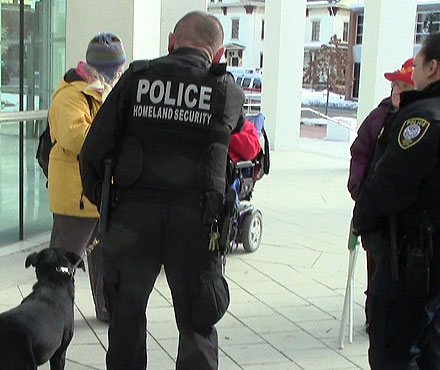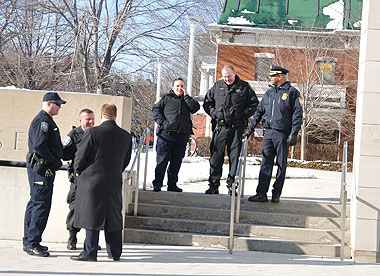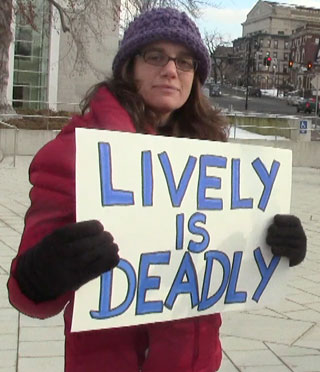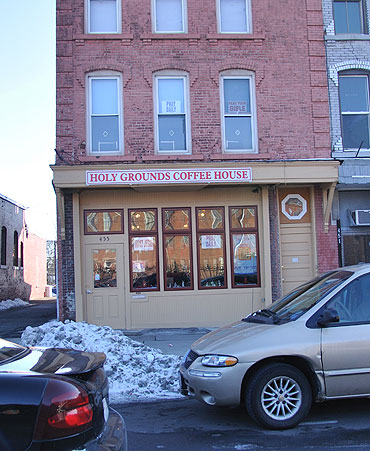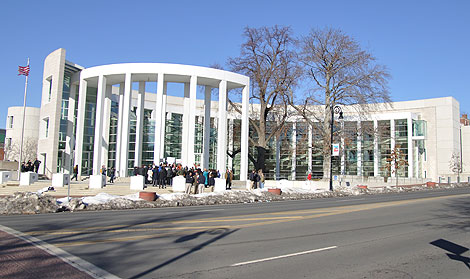 |
 |
Pro-family activism that makes a difference! | ||||
Federal Judge hears arguments on motion to dismiss "crimes against humanity" lawsuit against pro-family Pastor Scott LivelyLively's lawyer dismantles plaintiff's points, despite unusual process by judge POSTED: January 13, 2013On Monday, Jan. 7, the Motion to Dismiss hearing began on the outrageous "crimes against humanity" lawsuit filed against Pastor Scott Lively by the Soros-backed pro-homosexual group Center for Constitutional Rights (CCR). An overflow crowd of activists from both sides packed the Federal District in Springfield, Massachusetts.
The 1½ hour hearing before Judge Michael A. Ponsor was unusual in many respects and clearly biased in others. To pro-family citizens, it provided an uncomfortable view of the intensity and dishonesty of the homosexual movement coupled with the outrageous willingness of the judiciary -- even the Federal Courts -- to cater to their otherwise weak legal arguments. Representing Lively was his team of lawyers from Liberty Counsel, led by Horatio Mihet, with Steve Crampton and local counsel Phillip Moran. How the Motion to Dismiss hearing worksOn August 8, 2012, Lively's lawyers at Liberty Counsel filed a 109-page Motion to Dismiss in response to CCR's 61-page Amended Lawsuit against Scott Lively. They are attempting to sue Pastor Lively for "crimes against humanity" essentially to punish him for pro-family speeches he gave in Uganda several years ago about the homosexual movement there. See our report here. The general purpose of this hearing was for the judge to question the defense on various points of their Motion to Dismiss, and for the Plaintiffs to respond to the Defense's answers. From that, the judge would issue a decision whether to dismiss the case or allow it to continue. The homosexuals' strategy to "pack the courtroom"Although the hearing date had received very little publicity in the media, the courthouse staff nevertheless prepared two overflow courtrooms with closed-circuit video of the hearing. It would appear that this was in cooperation with local homosexual groups. As we reported last week, those groups had notices on their websites to encourage their activists to come and "pack the courtroom" in an attempt to influence the hearing, and also to hold a demonstration and rally at the courthouse. In answer to that, MassResistance and pro-family groups in the Springfield area also encouraged supporters to come.
Approximately 120 people showed up inside the courthouse, with more outside. About one-third of them were pro-family supporters -- some from as far away as Connecticut. The main courtroom was nearly evenly divided between pro- and anti-Lively people, and the two overflow rooms were filled with the remainder. The judge made a point of saying that it was the largest crowd ever to attend a hearing in that building (which was recently built). However, the court security staff, which included federal marshals, successfully maintained decorum inside the building.
But outside the building, before and after the hearing, the homosexual activists demonstrated, danced, chanted, screamed, and had a small rally with speeches after the hearing. (Watch for our upcoming report on the demonstration outside the building with video and more photos.) Many "Homeland Security" officers thereThe security in and around the courthouse was very strange and unnerving, unlike anything we'd seen before. We have never been to a courthouse -- state or federal -- where any Homeland Security people were present. This time there were quite a few. (Two of them told us they came from Boston.) Everyone was required show an ID to enter the building. A security team searched the courtroom itself before anyone was allowed to go in.
Judging by where the Homeland Security people stood and how they moved around, particularly outside the building, they seemed more interested in watching the pro-family people (the "radical right"?) than the homosexual activists who were clearly more aggressive. (Most of Lively's supporters were middle-aged, and none were rowdy.)
But also, while Scott Lively's Holy Grounds Coffee House is located about a half mile from the courthouse, two (and possibly three) Homeland Security vans were parked within 100 feet of it. Also, they were particularly strict about pro-family people not being able to video even in the court's outer vestibule (outside of the security check), even though the posted regulations seem to allow it. After the hearing, when the pro-family people left the area the Homeland Security people largely dispersed, even though the homosexual activists continued their activities outside. As the hearing begins, Judge shows his biasesThe First Circuit Court is considered one of the most liberal in the country, and unfortunately Judge Ponsor did not disappoint in that regard. He started off by saying that the courthouse had never seen such a big crowd for a hearing. Then said, "I'm pleased to adjudicate issues that affect the people of Uganda" -- an odd statement for a US Federal Judge to make. (We thought he was adjudicating a case about an American citizen!) Looking at the contingent in the audience from Africa, he remarked that it was "good to see the people whose interests are directly affected." There was no question where Ponsor's political feelings lay. He mentioned that Lively had "identified the gay movement as evil and destructive, and should be destroyed." At one point he described Pastor Lively as "kind of a minister of propaganda" who "kept the rhetoric turned up and inspired people." Ponsor made a point of saying that the First Amendment "includes speech that we hate" (referring to Lively's alleged pro-family discussions in Uganda) and further characterized them as "deeply offensive to many people." He repeatedly described the homosexual movement in Uganda as "groups [that] should be treated equally and given equal rights." But he didn't address whether groups got different legal "rights" in different countries. Finally, the normal procedure for a Motion to Dismiss hearing for the defense to go first in the questioning process by the judge and the prosecution to follow. Ponsor announced that this time he was turning it around: the prosecution would go first and answer his questions. It was very unusual. It appeared that he wanted to give them a greater opportunity to solidify their case, which on paper was weak. All of this indicated that the homosexuals' "pack the courtroom" strategy seems to have worked. The judge was clearly influenced and somewhat intimidated by the huge crowd that showed up along with the Soros-backed organization arguing the lawsuit. One certainly got the impression that an ordinary lawyer bringing up such an outrageous set of claims would have been dismissed in short order. Judge announces he's ignoring the Alien Tort ActHow can an American citizen be tried in a US court on making speeches in another country that were perfectly legal there? To allow this, the plaintiffs are attempting to use the Alien Tort Act, an obscure US law dating back to the 1700s. And they are admittedly using it in a way that (as they admit in their brief) has never been attempted before. However, the US Supreme Court is currently taking up an important case involving the Alien Tort Act, Kiobel v. Royal Dutch Petroleum Co., which could affect this case. So last summer Lively's lawyers moved to postpone this case until the Supreme Court rules on it, which would take up to a year. But Judge Ponsor denied that motion. At this hearing, Judge Ponsor announced that he was not going to consider the Alien Tort Act in this case -- even though doing so would surely help Scott Lively due to the unprecedented way the Act is being applied here -- because the Supreme Court is currently taking it up and his ruling regarding it could be contradicted! Focusing only on the First AmendmentPonsor said that all of his questions today would revolve on First Amendment issues. It naturally seems odd to apply the US First Amendment law to speech that took place in a foreign country. But CCR is attempting to use that Alien Tort Act to claim that Lively's "free speech" in Uganda should be prosecuted as if it had it happened here, even though Lively was never charged with any crimes in Uganda. And they allege it crossed the line to criminal activity under US law. Judge: "I'm struggling to see actionable behavior"Not surprisingly, Ponsor started the questioning to the CCR lawyer, Pam Spees, by stating that he is "struggling to see actionable behavior" in anything Lively did or said. He said he still can't see any of Lively's conduct that is "persecution" or "conspiracy." Even though Pastor Lively's speeches (i.e., discussions of pro-family issues regarding homosexuality) constituted "speech that we hate," said the judge, how could he be prosecuted for it? Under US First Amendment law, how did it constitute inciting violence, torture, persecution, conspiracy, murder, and human rights abuses, as the lawsuit claims? In other words, after reading the prosecution's lengthy complaint against Lively, the judge is still asking, "Where's the substance?" The prosecution tries to make its caseAnswering the judge's appeal for something of substance, Spees threw out everything she could. She claimed that Lively came to Uganda to create a "severe deprivation of fundamental rights on the bases of identity . . . a widespread attack on a population." She said that he was "planning with co-conspirators in Uganda," telling people to "ban gay pride parades" and "discriminate." Lively "aligned and plotted" with people, and his actions caused injuries and deaths to innocent homosexuals, she explained.
In addition, she charged, Lively met with government officials and helped them draft severe legislation that, even though it ultimately didn't pass, caused a chain of reaction of violence. His actions were "choreographed" to deny people the "enjoyment of basic rights." Spees went to great lengths to compare CCR's lawsuit against Lively to the Nuremberg trials because Lively was like the Nazis, she said, in the way that they denied the rights of Jews. The First Amendment doesn't protect this, she argued. She even threw in State of Massachusetts law, saying that Lively was guilty of "discrimination" and "diversity" offenses. The defense responds loud and clear!The one bright spot of the hearing was the response to all this by Horatio Mihet, Lively's primary Liberty Counsel defense attorney. Mihet was simply brilliant. He started by labeling CCR's case as "purposeful confusion" and took off from there. One by one, he took on each of Spees's charges, statements, and allegations against Lively and ripped them to shreds with legal reasoning, logic, facts, and his extensive research from past court cases. Mihet showed how CCR is blaming Lively for activity that happened literally years after his speeches and discussions in Uganda. Moreover, the plaintiffs could not demonstrate that Lively had any connection whatsoever to anyone who committed any illegal activity; he had certainly never met them nor was there even evidence they even heard him speak. Some of the illegal acts were blamed on incendiary newspaper articles about homosexuality. But the newspapers never interviewed Lively and the articles never referred to him. It's basically fabrication. What about Lively's meetings with government officials, which allegedly later ended up with the so-called "kill the gays" bill (which Lively actually disagreed with) that CCR says "deprived gays of rights"? But people meet with government officials on public policy matters all the time. There's nothing illegal about that. Mihet pointed out that under that logic, anyone who met with California public officials about the Proposition 8 in California or other anti-gay-marriage laws could be similarly charged with "crimes against humanity." Mihet additionally dismantled the "conspiracy" charges using the famous "Dr. Spock" case from the Vietnam War era, which involved the First Amendment and charges of conspiracy. Dr. Benjamin Spock had written a manual counseling students to break the law by burning their draft cards, and he was even present at a rally where they did it. The government charged him with conspiracy. But because he was only watching them at the rally and not actually participating, the courts said he and his writings had First Amendment protection. Lively's speeches and discussions, of course, came nowhere close to that. "The prosecution grossly misstates the law on conspiracy in the first amendment," Minot told the court. Mihet meticulously demonstrated how every one of the charges and allegations against Lively have no legal basis whatsoever, and furthermore are based on purposeful untruths, exaggerations, and misstatements by the prosecution. It was great to watch Mihet in action. He was passionate but calm, and had an enormous number of facts at the tip of his tongue. He ran circles around Pam Spees, and handled the questions from the judge so thoroughly that Ponsor finally cut him off. (Ponsor actually gave the prosecution much more time to talk, which was unusual for that kind of hearing.)
And moreThe questions to Spees and the rebuttals by Mihet continued to go back and forth. Ponsor brought up the injunction against Lively that they are seeking. He asked Spees, "If I were to issue an injunctive order, how would I do it? She answered that the judge should "prohibit him from stripping rights away." She added, "I agree that's novel." The judge said that "it is probably not necessary to allege Lively was leading a mob" to deprive gay people of their rights. But there had to be some active connection, and so far she hasn't demonstrated it. She answered that Lively "encouraged the criminalization" of homosexuality, and that he was part of a conspiracy to do that. The judge asked for actual evidence about the alleged conspiracy. Spees admitted that even though there was not a direct evidence of a conspiracy at this time, they would surely find one if the case were allowed to continue. In "discovery", she said, there is no question that the conspiracy would clearly emerge going through the various emails and other communication between Lively and others. Mihet jumped all over that one. You cannot sue someone on the basis that you will find the sufficient facts later to justify it. You must have them now to file a lawsuit. The judge was forced to agree. Wrapping upAfter 1½ hours, it clearly appeared that CCR really hadn't put anything together that the judge seemed to agree made a legitimate case. But he didn't react that way. He gave the impression that there might still be something there that will come to him as he thinks it over. He ended the hearing by saying that he would submit a written decision. He didn't give a time frame, but these typically can come as early as a few weeks or as far out as several months. Based on what we heard at this hearing, even though there is a fairly high bar for throwing out this kind of case, it seems to have been easily reached. There's just nothing there except angry rhetoric. Does the judge have the nerve to agree -- and thus humiliate the homosexual activists? We have to wait and see. Strangely, the reaction by the homosexual activists was one of jubilation. They were dancing and singing as if the judge had already allowed the case to go forward. They carried on outside with their rally and speeches and the general adolescent behavior that we've gotten used to. We will have photos and video on their demonstration and rally at the courthouse, including video and photos, in an upcoming email.
|
| Top |
